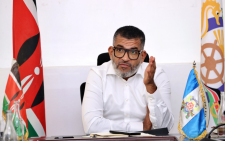Learners with diabetes face unique hurdles in school

The birth of a child with a long term ailment, or the discovery that a child will have difficulty performing normal day-to-day activities because of a terminal illness can have profound effects on the family.
While a family may find ways to accommodate and care for the child, accessing learning institutions that can accommodate your child’s special needs can be a challenge. “In most cases, a typical classroom in any public school is unlikely to be an ideal setting for a child suffering from a chronic ailment. Many of these conditions always require special attention,” says Grace Muthoni, whose child suffers from epilepsy.
She says many schools are reluctant to admit these children as they perceive them a burden and they will not be in a position to cater to their needs, such as providing special food and specific medication, which might not be available in the school dispensary. Some schools do not have a clinic or resident medic at all.
Around-the-clock care
One of these diseases is diabetes. This ailment includes several metabolic disorders that if left untreated, result in abnormally high concentration of a sugar known as glucose in the blood and for that reason, the diabetes patient needs special attention around the clock.
Daniel Maina* explains how he had it rough trying to find a secondary school for his diabetic daughter who scored good grades in the Kenya Certificate of Primary Education last year.
“Finding a school for my daughter to join was a big challenge because she keeps being rejected by schools due to her delicate condition,” he says.
One of the schools Maina sought for her daughter was Entoomasiani Secondary School in Kajiado County, but after going through the doctor’s health report, which showed that she was diabetic, they were denied admission. “When the school saw my daughter’s medical report, they said they regret that the school could not admit her,” he recounts, adding “We were frustrated and wondered whether children with such conditions have no right to education.”
When Scholar reached out to the administration of Entoomasiani Secondary School, the school said they could not admit the girl, because according to her medical report, the doctor was of the opinion that she goes to a school in Nairobi where she would be closer to her parents for close monitoring.
“The medical report noted that the child is required to check blood sugars every four hours and advised that she be close to an endocrinologist for checkup if need be and that she could go into hyperchloremia unexpectedly, which can lead to complications, hence the need to be close to her parents for close supervision,” said a school administrator on condition of anonymity.
She, however, said they could alternatively admit the girl if she came as a day scholar.
Another parent with a diabetic child who sought anonymity says finding a school for a diabetic child is not easy, because many schools are reluctant to admit them. He says that parents are also forced to go to these schools frequently to take extra snacks to them.
Dr Daniel Katambo, DMI Board Member and Programmes Director says at school, most children with diabetes will need to check their blood sugar levels, take insulin or other diabetes medicines watch for and treat blood sugar highs and lows, eat snacks and lunch at a certain time, have easy access to water and time for bathroom breaks and participate in physical activity. “The condition in children can be managed anywhere depending on the available resources and information. Awareness on the same should be created in schools,” he says.
Academic difficulties
On the flip side, there are schools which readily admit these children. Shining Star Academy in Kitengela, Kajiado County head teacher Nicholas Kiilu at the school points out that their school does not discriminate, it admits all qualified students. “Our school has at least one assigned teacher who will be monitoring the diabetic children. They ensure that they get their food in time and snacks in between, because these requirements are included in the doctor’s prescription,” he remarks, adding that the children need more attention because they tend to have difficulties with paying attention, memory, processing speed and perceptual skills if the condition is not managed properly.
He further reiterates that a teacher who has been assigned the children have to be very understanding because they are mostly short-tempered and tend to miss some classes when they visit hospital for check-up or are not feeling well hence these teachers are forced to take them through the missed lessons.
Christine Robi, a nurse aid at St Lilyana School in Kajiado County says it is advisable for all schools to have a clinic, which has all the needed medical eqipment in case of emergencies for diabetic children because the sugar levels rise unannounced and can be fatal if not addressed immediately. “It is paramount that all schools should have a dispensary stocked with medicine to help the diabetic children, especially injections and insulin,” she offers.
For day scholars, she says parents or guardians should create a backpack checklist for their diabetic children and be sure all necessary supplies are packed, such as a blood sugar metre and extra batteries, testing strips, lancet devices among others.









